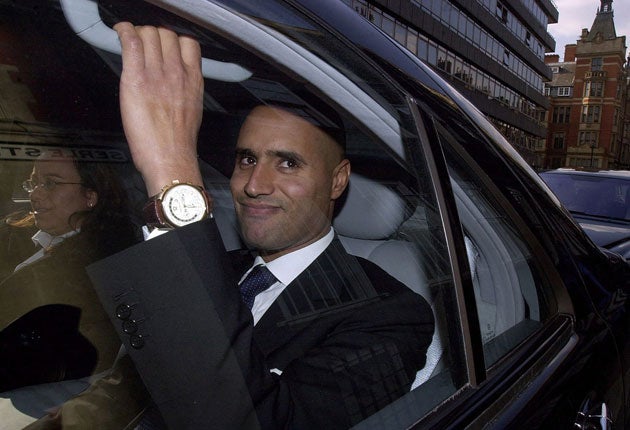Revealed: MI6 saved Saif Gaddafi from death threat

British intelligence and Scotland Yard were involved in an international operation to protect Saif al-Islam, the son of Muammar Gaddafi, from an Islamist plot to assassinate him on British soil, secret files discovered by The Independent have revealed. The British intelligence services suspected that the plot was linked to Qatar, currently the West's foremost Arab ally against the Libyan regime.
MI6 and the SAS are now involved in the hunt for Saif, along with other members of the Gaddafi family who remain elusive in the endgame of the Libyan civil war. The dictator's son has been condemned by the Prime Minister, David Cameron, and Nicolas Sarkozy, the French President, for his part in the brutal crackdown which followed the February revolution and for which he faces war-crimes charges.
But, in the past, MI6 urgently contacted its French counterparts after Libyan authorities reported that a terrorist cell linked to the Gulf state of Qatar was planning the attack from Paris. The French told UK officials at the time that "the Qatari Interior Minister was known to be an Islamist extremist sympathiser".
No evidence was presented to back up the charge. But, in 2003, the same minister was likewise believed by members of the US intelligence community to have links to al-Qa'ida. In a Los Angeles Times report in March of that year, Sheikh Abdullah bin Khalid al-Thani was said to have sheltered terrorists at his farm. Richard Clarke, a former White House counterterrorism director, said that his role as security chief inside Qatar presented a serious danger to US forces posted there. Qatari officials did not comment on the claims.
Seven years on, Qatar is now one of the largest funders of the Libyan opposition who are forming the new government in Tripoli after overthrowing Muammar Gaddafi. Qatar is also a conduit, it is claimed, for supplying Western arms to the rebels.
Details of the Libyans' move to seek help from the UK in saving the life of the dictator's son came in a letter from a senior MI6 official to an official in the regime's international relations department. It was among a tranche of documents related to Saif al-Islam found at the Foreign Ministry in Tripoli and the office of Moussa Kusa, the country's former Foreign Minister and former spymaster who defected from the regime in the early days of the revolution.
Other papers relate to the part played by Col Gaddafi's son, and one-time heir apparent, in rapprochement with the West, including disclosures about the regime's nuclear programme and a defamation case he brought against a British newspaper.
Saif al-Islam's contribution to the regime's attempts to lose its pariah status is described in one British document as "highly constructive and welcome". The need for his successful libel action against The Sunday Telegraph in 2002, which had accused him of being part of a money-laundering scam, was viewed by a senior UK security official as an "unfortunate" matter which had, thankfully, been concluded.
Some observers believe that, ironically, the laundering claims, originally made in the mid 1990s, were the product of an MI6 misinformation-campaign when Libya was deemed to be a "terrorist state".
But, in the letter of 20 January 2004, MI6 was only too willing to help protect Saif. It said: "We have passed the details regarding the threat to Saif to our French counterparts. They have advised us that they do not have any traces on the individuals in the report and that there is no indication that they are in France... They commented that the Qatari Interior Minister was known to be an Islamist extremist sympathiser. They are carrying on with their investigation."
The MI6 letter continued: "The report has been passed on to the Metropolitan Police Special Branch and Saif has been placed on their at-risk register. The police have visited Saif to discuss the threat with him and he appears content with the measures being taken."
At the time Saif, who had a home in the UK, was being viewed by the British government as a key figure in bringing Libya in from the cold and ending its search for a nuclear arsenal. In the process, the regime also exposed the activities of the Pakistani scientist A Q Khan, who had been running a black market selling nuclear know-how to rogue states and striving to create an "Islamic bomb".
In the same month when MI6 and Scotland Yard were investigating the murder plot, Saif had described, in an interview, how he had persuaded his father to give up his attempts to build an arsenal of weapons of mass destruction and to co-operate with the US and UK. He disclosed that Libya had spent $450m (£278m) in an effort to build the bomb. He had been, he said, a "troubleshooter" in talks with British and American officials. "I was able to take messages to my father and explain to him. By the end, we had a good relationship with the CIA, MI6 and all the Americans and British."
Col Gaddafi had needed to be reassured that the Americans and the British did not have a hidden agenda for regime change in Libya. "Once they assured us they did not, everything went forward," said Saif, declaring that the development was a "new page in Libya's history".
Saif's role was praised in another letter by a British official in September 2004. "Saif's contribution in the ongoing dialogue is highly constructive. We are making good progress and his encouragement is welcome." The note stressed that obstacles to good relations with Libya were being removed through "mutual effort".
Join our commenting forum
Join thought-provoking conversations, follow other Independent readers and see their replies
Comments
Bookmark popover
Removed from bookmarks